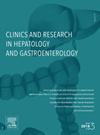Liquid biopsy as a tool for KRAS/NRAS/BRAF baseline testing in metastatic colorectal cancer
IF 2.6
4区 医学
Q2 GASTROENTEROLOGY & HEPATOLOGY
Clinics and research in hepatology and gastroenterology
Pub Date : 2024-07-14
DOI:10.1016/j.clinre.2024.102417
引用次数: 0
Abstract
Background
The absence of KRAS and NRAS gene mutations (RAS wild type) in metastatic colorectal cancer (mCRC), is associated with a good response to targeted therapy with anti-EGFR receptor antibodies. The current gold standard for RAS mutational status identification is genetic testing on tissue biopsy samples.
Objective
This study aimed to assess the relevance of liquid biopsy as a less invasive alternative to tissue biopsy for detecting KRAS/NRAS and BRAF mutations in patients with metastatic colorectal cancer (mCRC). The study also aimed to determine the concordance between liquid biopsy and tissue biopsy.
Methods
This is a phase IV, observational, uncontrolled, non-comparative, non-randomized, open label study. RAS/BRAF status will be tested at baseline using tissue and liquid biopsy using the Idylla/Biocartis PCR-based device. The primary endpoint is the comparison of the RAS status based on liquid biopsy with the RAS status based on tissue biopsy.
Results
100 patients with mCRC were included in the study. 75 % of patients showed concordant results between liquid biopsy and tissue biopsy, while 25 % had discordant results. Liquid biopsy demonstrated a sensitivity of 62 % and a specificity of 93 %. The accuracy of liquid biopsy was 75 %, with a moderate agreement between the two tests. The most frequent mutations in concordant cases were in KRAS (41 %), followed by NRAS (4 %) and BRAF (3 %). Mutations were not detected in 42 % of tissue biopsy samples and 60 % of liquid biopsy samples. The presence of hepatic metastases did not significantly affect the concordance between the biopsy methods.
Conclusion
Liquid biopsy using the Idylla™ system showed a relatively low sensitivity but high specificity for detecting KRAS/NRAS and BRAF mutations in mCRC patients. Despite some discordant cases, liquid biopsy remains a promising alternative to tissue biopsy due to its non-invasiveness, ability to provide multiple samples, and better representation of tumor heterogeneity.
液体活检作为转移性结直肠癌 KRAS/NRAS/BRAF 基线检测工具。
背景:转移性结直肠癌(mCRC)不存在 KRAS 和 NRAS 基因突变(RAS 野生型),这与抗EGFR 受体抗体靶向治疗的良好反应有关。目前鉴定 RAS 基因突变状态的金标准是对组织活检样本进行基因检测:本研究旨在评估液体活检作为组织活检的一种微创替代方法,在检测转移性结直肠癌(mCRC)患者的 KRAS/NRAS 和 BRAF 基因突变方面的相关性。该研究还旨在确定液体活检与组织活检之间的一致性:这是一项 IV 期、观察性、非对照、非比较、非随机、开放标签研究。将使用基于 Idylla/Biocartis PCR 的设备,通过组织活检和液体活检对 RAS/BRAF 状态进行基线检测。主要终点是比较基于液体活检的RAS状态和基于组织活检的RAS状态:研究共纳入100名mCRC患者。75%的患者液体活检结果与组织活检结果一致,25%的患者结果不一致。液体活检的敏感性为62%,特异性为93%。液体活检的准确率为75%,两种检测结果的一致性适中。一致病例中最常见的突变是 KRAS(41%),其次是 NRAS(4%)和 BRAF(3%)。42%的组织活检样本和60%的液体活检样本未检测到突变。肝转移的存在对活检方法之间的一致性没有明显影响:结论:使用Idylla™系统进行液体活检对mCRC患者KRAS/NRAS和BRAF突变的检测灵敏度相对较低,但特异性较高。尽管存在一些不一致的病例,但液体活检因其无创、可提供多个样本以及更好地反映肿瘤异质性等优点,仍是一种很有前景的组织活检替代方法。
本文章由计算机程序翻译,如有差异,请以英文原文为准。
求助全文
约1分钟内获得全文
求助全文
来源期刊

Clinics and research in hepatology and gastroenterology
GASTROENTEROLOGY & HEPATOLOGY-
CiteScore
4.30
自引率
3.70%
发文量
198
审稿时长
42 days
期刊介绍:
Clinics and Research in Hepatology and Gastroenterology publishes high-quality original research papers in the field of hepatology and gastroenterology. The editors put the accent on rapid communication of new research and clinical developments and so called "hot topic" issues. Following a clear Editorial line, besides original articles and case reports, each issue features editorials, commentaries and reviews. The journal encourages research and discussion between all those involved in the specialty on an international level. All articles are peer reviewed by international experts, the articles in press are online and indexed in the international databases (Current Contents, Pubmed, Scopus, Science Direct).
Clinics and Research in Hepatology and Gastroenterology is a subscription journal (with optional open access), which allows you to publish your research without any cost to you (unless you proactively chose the open access option). Your article will be available to all researchers around the globe whose institution has a subscription to the journal.
 求助内容:
求助内容: 应助结果提醒方式:
应助结果提醒方式:


